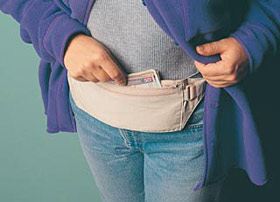 |
 |
 |
 Travel & Outdoors | April 2005 Travel & Outdoors | April 2005  
Preventing Identity Theft While Traveling
 Rick Steves - ABCNews Rick Steves - ABCNews


| | Use a money belt to keep your passport, cash, bankcards and identity safe. |
Identity theft — when a criminal steals your personal information and uses it to commit fraud or other crimes — has become annoyingly common. The most susceptible pieces of information are your Social Security number and birth date. With these two tidbits and your full name, someone can grab your identity. Here are some tips you can use — especially while overseas — to protect yourself.

Take as few bankcards with you as possible. Keep them safely in your money belt — a small, nylon-zippered pouch that ties around your waist under your pants or skirt (sold at travel stores). Don’t carry identification that includes your Social Security number unless you absolutely must.

Memorize your Personal Identification Number; you’d be surprised at how many people write it on their bankcard (which is extremely dangerous). “Shoulder surfing” — a thief watching you as you type your PIN into a keypad — is a common problem. When entering your PIN, carefully block other people’s view of the keypad, covering it with your free hand.

Use your bankcards sparingly. Shop clerks and restaurant servers might try to steal your credit-card information. Pay in cash. Withdraw sizable amounts of local cash from ATMS (stow big bills in your money belt to protect against pickpockets) so you can pay with paper whenever possible.

Use your debit card only for cash-machine withdrawals. To make purchases, pay with cash or your credit card. Because a debit card draws funds directly out of your bank account, charges incurred by a thief are scary — it’s your money that’s gone. You’re usually liable for only $50, but it’s still worrisome. Talk to your bank about setting a daily withdrawal limit for your ATM or debit card — but note that the limit applies to cash-machine withdrawals, not purchases.

Make photocopies of your passport and credit cards — front and back. They’ll be easier to replace in case of loss or theft. However, guard these photocopies as carefully as you would the originals. I hide mine in a second money belt clipped into the bottom of my luggage (don’t tell anyone). If your bankcards are stolen, report your loss immediately to the respective global customer-assistance centers. Call these 24-hour U.S. numbers collect: Visa (tel. 410-581-9994), MasterCard (tel. 636-722-7111), and American Express (tel. 336-393-1111).

Internet cafés are an easy way to keep in touch while you’re in Europe, but they’re especially susceptible to identity thieves. Don’t use these computers to pay bills or carry out other business that involves personal information.

Upon returning home, verify the balance and charges on your debit and credit cards. Whether or not you’ve recently been traveling, it’s always smart to periodically check all of your accounts. Get a credit report to be sure that your credit history is accurate. (You can get one free each year — see www.annualcreditreport.com.)

As with preventing other kinds of theft, the key here is to outsmart the thief. With a few precautions, you can spend your time in Europe thinking about where to get your next scoop of gelato, not worrying about the security of your bank accounts.

What to Do If Your Identity Is Stolen

Unlike a stolen credit card, the signs of identity theft may take a long time — even months — to surface. If it occurs, file a police report and send copies to creditors. Contact any one of the three major credit-reporting agencies to report the fraud: TransUnion (tel. 800-680-7289, www.transunion.com), Experian (tel. 888-397-3742, www.experian.com), or Equifax (tel. 800-525-6285, www.equifax.com). Also consider filing a report with the Federal Trade Commission (www.consumer.gov/idtheft) and the Office of the Inspector General (www.ssa.gov/oig/guidelin.htm). Other good resources are the Identity Theft Resource Center (www.idtheftcenter.org) and the Privacy Rights Clearinghouse (www.privacyrights.org). | 
 | |
 |



